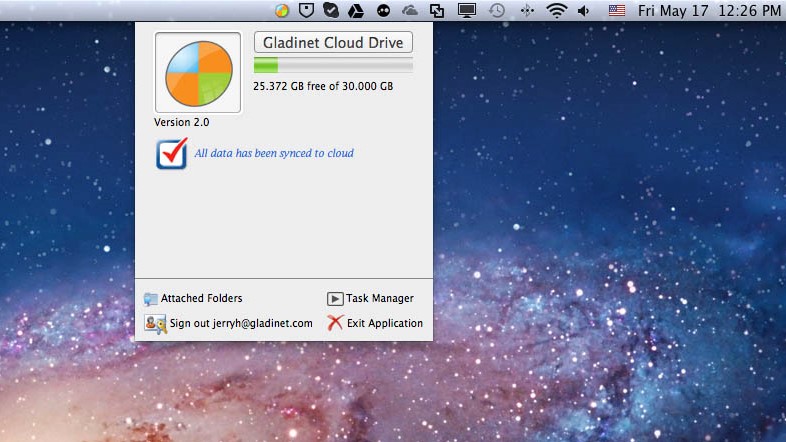Gladinet CentreStack
Founded in 2008, Gladinet is US-based cloud computing platform is one of the best-known enterprise file synchronisation and sharing (EFSS) solutions.
Where this solution diverges from almost everything else is that you’re not limited to using the online storage, but instead can merge in local file servers to become part of a hybrid solution.
The unique approach and the ability to merge multiple online storage solutions into a single service have made Gladinet CentreStack a popular option in some companies.

Interface
Before we start, we need to point out that Gladinet is going through a rebranding exercise at the time of writing, and the product that used to be known as Gladinet Cloud Enterprise is now CentreStack.
For operating system connectivity, Gladinet CentreStack ticks all the standard boxes and a few that very few people use.

Windows, MacOS, iOS, Android and web-based access are all available, but also this is one of the only products that still supports Windows Phone 8 and Windows Surface (RT).
For most users, they’ll be gloriously unaware of Gladinet (or CentreStack) as it works in the background with existing file servers to merge local and cloud storage into a unified solution.
There are administration interfaces and client utilities that can inform the user that their files are secured by Gladinet, but for the most part network users will be ignorant of its operation.
The Team edition of the software has tools for managing shares to team members and groups, making it suitable for those away from the office for long periods.

Features
To best understand how different Gladinet CentreStack is from other online storage solutions you need to embrace the fact that this company isn’t looking to sell virtual server space.
Therefore you can use Amazon S3, OpenStack, Rackspace, Google, Azure, HPCloud or IBM Cloud Storage account as your chosen online provider, or importantly, any combination of them.

The umbrella functionality of Gladinet CentreStack allows all the details of these resources to be kept away from the end user, simply providing them with a mounted network drive through which they can access their files as usual.
Users can be administrated, controlling what they have access to and also defining quotas for the amount of space they can use.
However, the truly clever part of the CentreStack solution is how it integrates existing local file storage to enable immediate access to files that aren’t yet secured online when the system is initialised.
This feature is especially useful if the system is migrated from one online storage provider to another, as the users won’t experience any downtime or limits to their access during the initial sync.
Files can still be backed up locally, and if the users aren’t local, they can still access Gladinet CentreStack managed files even if they’ve yet to travel to the cloud storage.
The obvious point here is that unlike other providers, Gladinet isn’t in the business of competing with Amazon S3 or Microsoft Azure, but is built to allow others to exploit these facilities to their business advantage.
Tools and security
Because much of what Gladinet offers is focused on its relationship with local file storage inside the customer business, their security is aligned with those models.
Therefore full NTFS permissions and Active Directory identities are preserved for any Cloud secured files or structures, avoiding permission issues in the event of a restore.
The central management console can revoke privileges to files to any user or group and encrypt the cache remotely.
All file creations and subsequent modifications are recorded in an audit history, and these can be reviewed to determine when a particular user changed a document or deleted a file.
With this close integration with existing network security, the IT department won’t need to build a whole new rule set to control cloud access and permissions.

Pricing
Amazingly there is a Free Starter Edition available for Windows (XP upwards) that you can download and experiment with using any PC.
There is also a Desktop Pro version, but the first solution that small businesses would be interested in is the Team Edition.
That costs $512 (£391) per year, but the license is a 5-user plan, so that works out as just over $8.53 (£6.50) per month per user. Extra users can be added for $108 (£83) per annum.
With a 5-user plan Gladinet bundles 1.1TB of storage making this easily one of the best value deals around. You are not limited to increasing that storage through Gladinet, as you can bolt in S3 or whatever service you like and expand the online storage capacity.
Basic service is included as standard, but you can upgrade to Premium or Premium Plus service with enhanced response times to critical and severe issues.
Premium support is an extra 15% on top of licensing costs, and Premium Plus is 15% and $500 (£382) per month, making it something only a large license user would consider.
With Premium Plus service Gladinet expect to achieve a critical response in less than 15 minutes, and a severe response in less than an hour. Those response times make it highly suitable for mission-critical services.
Final verdict
Where Gladinet totally diverges from other cloud service tools is that the company will license their product not only to be installed by the customer and run independently of them, but they’ll even allow other companies to rebrand the product and sell it on themselves.
Pricing for those versions requires Gladinet to quote, and access what it is you intend to do with their application.
This solution would, therefore, suit the type of organisation that likes to take complete responsibility for their IT solutions, and not be dependent on external services if they can help it.
The solutions offered by Gladinet puts them in the enterprise category, although smaller businesses could benefit from the flexibility and security that this technology offers.
- We've also highlighted the best cloud storage services
0 comments:
Post a Comment